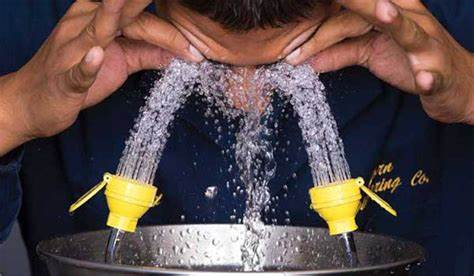Who do You Trust?
Several years ago, the safety manager for a client called me to ask about a concern. The client, in this case
a municipality, had just received citations from North Carolina OSHA (NCOSHA) which were the result of an inspection which had occurred a few months earlier. One particular citation was especially troubling to the safety manager and thus the reason for his call. Among other things, the employer had been cited for not having an emergency eyewash in a lab where workers routinely handled very caustic chemicals. The client did not dispute the fact there should have been an emergency eyewash in the lab and responded quicky to have one installed. The concern was over instructions provided within the citation. Such instructions are called “abatement notes” and are intended to provide guidance to the employer in achieving compliance with the specific citation. The note of concern read, “A suitable eye wash must have: …a copious flow of potable water for at least fifteen minutes with a temperature above freezing and less than 212F.”
So NCOSHA, in this instance, is saying that a water temperature of 211°F with a minimum fifteen-minute exposure is acceptable. My goodness, that is just one degree below the boiling point for water and 56 degrees above what is considered scalding! Clearly a serious hazard to any user. Following this OSHA-provided instruction would give the employer the false comfort they were now satisfying requirements for safeguarding lab workers-that is until an employee splashed acid in his/her eyes and ran for the emergency eyewash.
Had the individual at NCOSHA who provided this false information been familiar with requirements for installation and maintenance of emergency eyewashes, they would have known the acceptable temperature is described as “tepid” which is a range between 60-100°F.
Getting to the Point
My point is that providing false or inaccurate information can result in serious injury or even death. More to my point, some false teachings can result in separation from God and an eternal death in the pits of hell.
Scripture warns us about false teachers. Peter puts it this way. “But there were also false prophets among the people, even as there will be false teachers among you, who will secretly bring in destructive heresies, even denying the Lord who bought them, and bring on themselves swift destruction.” (2 Peter 2:1, NKJV)
A false teacher will not only provide inaccurate information that could push someone away from God but may also omit Scriptural teachings that could otherwise lead someone to God. There are many in the pulpit today who fall into this category. Some can be seen on television delivering sermons to millions every Sunday morning. Such leaders and their followers are in for a bad, bad time. See Care for My Sheep.
Test the Spirits
So, how does one know if the teachings they are receiving are truly of God or are the thoughts or perhaps self-indulgent misinterpretations of a false teacher? John tells us to “test the spirits.”
“Beloved, do not believe every spirit, but test the spirits, whether they are of God; because many false prophets have gone out into the world. By this you know the Spirit of God: Every spirit that confesses that Jesus Christ has come in the flesh is of God, and every spirit that does not confess that Jesus Christ has come in the flesh is not of God. And this is the spirit of the Antichrist, which you have heard was coming, and is now already in the world.” (1 John 4:1-3, NKJV)
Listen carefully to the teachings so you will know if they are of God. Are the pastor’s or teacher’s words consistent with or contrary to Scripture? Study the Bible so you will be able to discern God’s word from teachings which are not of God. Following false teachings may not scald your eyeballs, but you could surely lose your eternal life in heaven.


Leave a comment